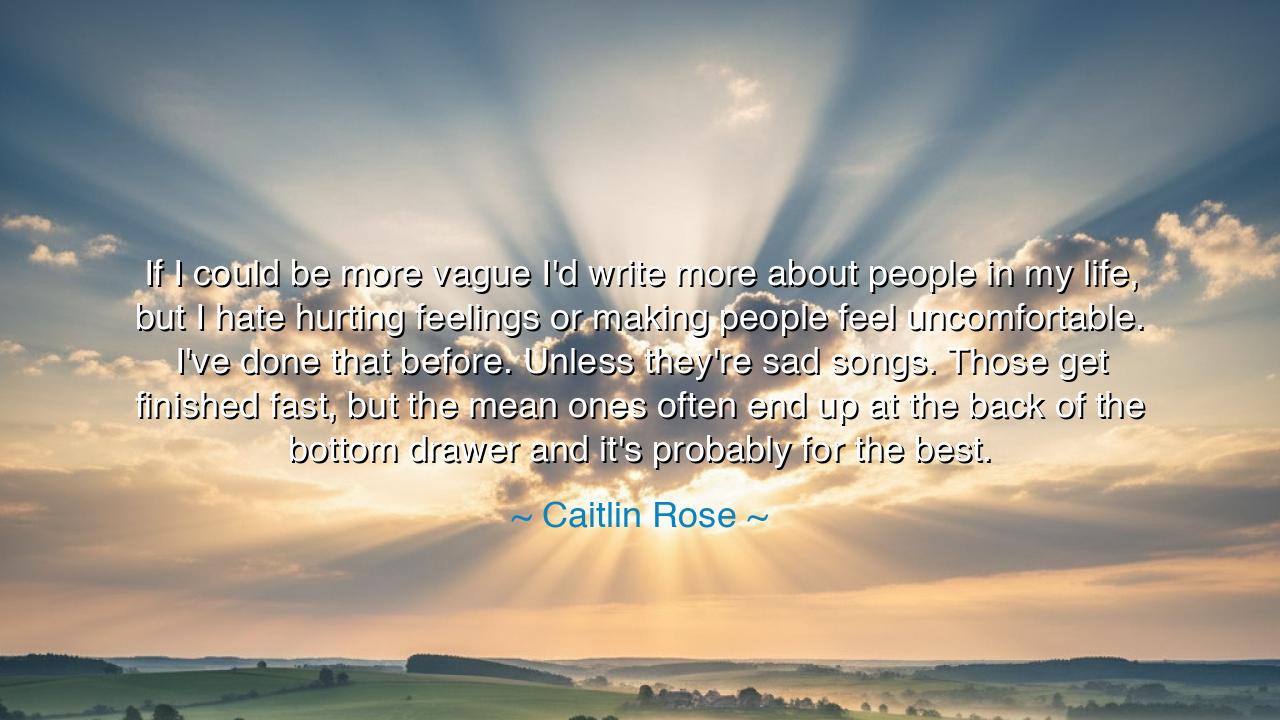
If I could be more vague I'd write more about people in my life
If I could be more vague I'd write more about people in my life, but I hate hurting feelings or making people feel uncomfortable. I've done that before. Unless they're sad songs. Those get finished fast, but the mean ones often end up at the back of the bottom drawer and it's probably for the best.






When Caitlin Rose said, “If I could be more vague I’d write more about people in my life, but I hate hurting feelings or making people feel uncomfortable. I’ve done that before. Unless they’re sad songs. Those get finished fast, but the mean ones often end up at the back of the bottom drawer and it’s probably for the best,” she revealed the quiet moral struggle of the artist—the war between truth and tenderness, between the need to express and the duty to protect. Her words are not merely about songwriting; they are about the delicate balance between honesty and compassion, the eternal tension between what the heart feels and what the conscience allows.
In her confession, there is wisdom born of experience. Every artist, writer, or truth-teller faces this same dilemma: to speak truth fully is to risk wounding, but to conceal it entirely is to deny the spirit its freedom. Caitlin Rose, a songwriter whose craft depends upon honesty, understands that words carry the weight of emotion, and emotion can cut as sharply as it can heal. To write about the people in her life would be to expose them, even unintentionally, to the judgment of others. And so she restrains her pen—not out of fear, but out of kindness. There is grace in such restraint, for the ancients knew that mercy in speech is often greater than eloquence itself.
The sad songs, she says, “get finished fast.” This is because sorrow is pure—it carries no malice, only longing. To write of grief, of loss, of the tender ache of love fading, is to cleanse the soul. Sadness seeks expression; it wishes to be released, to find its echo in another heart. The “mean songs,” however—the songs born of anger, bitterness, or vengeance—are harder to complete. They burn too hot, and their fire threatens to consume the writer as well as the subject. To place such a song “in the bottom drawer” is an act of wisdom. It is not cowardice, but maturity—the understanding that not every truth must be shouted, and not every wound deserves to be reopened.
The ancients understood this truth well. Euripides, the tragic playwright, often wrote of human passion and rage, yet his greatest power came not from accusation but from empathy. He once said, “When a man is wronged, he should write, not to wound the world, but to understand his own heart.” So too, Caitlin Rose chooses understanding over vengeance. By withholding her harshest words, she allows time and perspective to temper them. What remains, in the end, are songs that heal rather than harm—songs that connect rather than divide. In this, she honors the sacred duty of the artist: to illuminate, not to destroy.
Her reflection also reveals a profound moral sensitivity, a recognition that creation is not separate from conscience. The modern world often celebrates raw honesty without wisdom, as if the only virtue were bluntness. But true art, like true speech, must carry both courage and compassion. To be “vague,” as she puts it, is not to be weak—it is to recognize that truth can be shaped gently, without losing its power. The poet who wraps her pain in metaphor still speaks truth, but does so in a way that preserves dignity. In the ancient East, the poet Li Bai often disguised his heartbreak in images of rivers and moonlight, because he knew that beauty softens the edge of pain.
The meaning of Caitlin Rose’s words extends beyond songwriting. It is a lesson for every soul that wields the power of words. Whether in art, in friendship, or in conflict, one must ask: does my truth bring healing or harm? There is bravery in honesty, but greater bravery in discernment. To tell the truth with love requires discipline; to remain silent when anger burns demands wisdom. The “bottom drawer” she speaks of is not a graveyard of cowardice—it is a sanctuary of restraint, a reminder that not every emotion deserves release.
So let this be the teaching: speak, but with mercy. Create, but with conscience. Let your sadness become song, but let your anger rest until it transforms into understanding. For the truest artist is not the one who exposes the wounds of others, but the one who transforms their own wounds into light. As Caitlin Rose shows us, it is better to keep the mean songs in the drawer and let the gentle ones live—because kindness, once woven into art, will echo longer than cruelty ever could.






AAdministratorAdministrator
Welcome, honored guests. Please leave a comment, we will respond soon